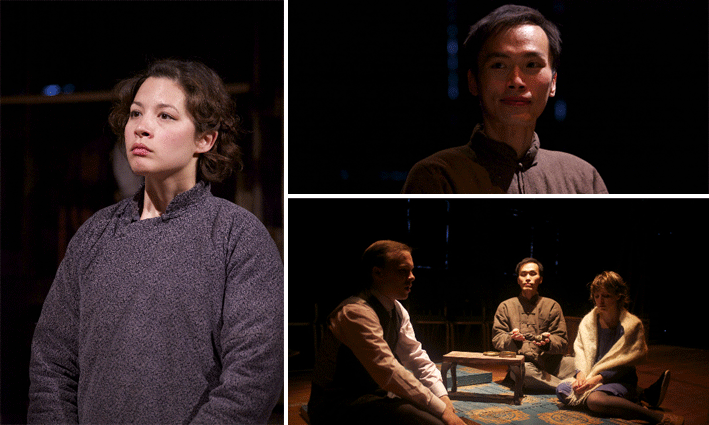| Review of Limehouse Nights |

|

|

|
| Culture | |
| Sunday, 06 June 2010 | |
|
Review: Limehouse Nights Kandinsky Limehouse Town Hall 26 May 2010 It is widely recognised now that London's nefarious "Old Chinatown" in Limehouse was anything but reality. Dangerous back alleys filled with sinister Chinese men gambling or opium-smoking, as visualised in films such as Piccadilly or Fu Manchu, are no more than the imaginations thrown up by journalists, novelists or filmmakers in need of an authentically exotic space to tie up with their fascinations. Amongst writers (such as Oscar Wilde, Agatha Christie and Arthur Connan Doyle) who collectively created and immortalised the mystical Chinatown is Thomas Burke, famed for a series of short stories set in Limehouse, a few of which have been adapted for the screen. It thus seems befitting that playwright and director James Yeatman chooses to assign the writer's name to a fictional character in theatre company Kandinsky's entertaining new production LIMEHOUSE NIGHTS. Burke becomes a police inspector who, not unlike the writer in real life, is fascinated by the "mysterious" Chinese people living in the docklands in the early 20th century. The inspector's first hand "Chinatown" experiences include a guided tour of Limehouse, a collection of authentic-looking souvenirs, and encounters with prostitutes. As if dictated by fate, a scandalous death of one iconic actress brought the life of Inspector Burke closer to Limehouse. The case is assigned to Burke, which allows him to explore further the small Chinese community in the area. As he conducts his investigations, Burke establishes an awkward yet steady relationship with a Chinese man, Lee Chee Kong, and his Irish wife, Mita Lee. With the case being deemed "easy" by Burke's higher-ups ("How can they be innocent? They are Chinese!"), Burke's growing compassion towards his new acquaintances finally jeopardises both his career and friendship. While the plot line may seem somewhat conventional, the play does attempt to undo the typified image of early Chinese immigrants through Inspector Burke's persistent quest. The uneasy friendship between a police officer and immigrants who just want to make livings on a foreign soil is wonderfully enacted by Tom Ferguson's Burke, William Mychael Lee's Lee, Jeremy Tiang's Ho Chi Chung (Lee's neighbour downstairs), and Julia Sandiford's Ho Siu Ching (wife of Chi Chung). One cannot help but feel for Burke's perhaps wrongly placed sincerity towards the immigrants, particularly when he visits them during the Christmas time. Ed Handcock's few but impressive appearances as the sneering police boss underlines the mistrust towards earlier immigrant communities, a theme one might also find relevant today. The contrast between the high society and the low slum life is brilliantly captured by Sarah Sweeney, Alex Mark, and Kerry-Jayne Wilson (Mita Lee). Lighting (James Turner Inman) and stage design (Amy Cook) also enliven the interior space within the Grade II listed Limehouse Town Hall. The production itself is not flawless (for example, props in relation to Chinese culture), but it offers good entertainment as well as interesting thoughts on the questions of cultures, place and communities.
Lia Liang Photo credits: Dan Patrick
About the author: Lia Wen-Ching Liang has a PhD in drama and theatre studies. She is currently researching into contemporary intercultural theatre and "Oriental" musical comedies in early Twentieth Century. She lives and works in London.
LIMEHOUSE NIGHTS Until 11 June 2010 Venue: Limehouse Town Hall (646 Commercial Road, Limehouse, London, E14 7HA) For bookings and more information on Kandinsky please visit http://www.kandinsky-online.com/ Gripping.....an entertaining evening; ambitious, intriguing and Limehouse to the core.' Londonist A hugely ambitious project.....James Yeatman has taken juicy material and squeezed...fine performances... the appropriateness of Limehouse Town Hall as a setting and décor that makes a lot out of very little' Time Out 'A fascinating story' The Metro Sparks questions about humanity and conscience ....engaging performances ...the dialogue is skilfully executed and the picture of different cultures colliding is powerful.' London Theatre Reviews |
|








